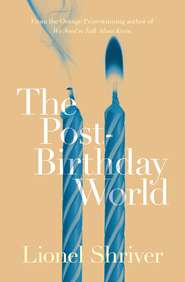По всем вопросам обращайтесь на: info@litportal.ru
(©) 2003-2024.
✖
The Female of the Species
Автор
Год написания книги
2018
Настройки чтения
Размер шрифта
Высота строк
Поля
He’d meant to reassure her. It wasn’t working. “Because it ended—so badly.” Then Errol blurted, “I’m sorry!” with a surge of feeling.
“I am, too,” she said quietly, but she didn’t understand. He was sorry for everything—for her, for what he’d put off telling her all night, even, of all people, for Ralph. Jesus, he was certainly sorry for himself.
Pale with regret, Errol paced the den, trying to delay delivering his piece of news a few minutes more. And perhaps it is possible for parts of your life to flash before your eyes even if you’re not about to die—because for a moment Errol remembered this last year of a piece, holding it in his hands like an object—a totem, a curio.
A year ago Gray had uneventfully turned fifty-nine. Errol had finally convinced her to do a follow-up documentary on Il-Ororen: Men without History. Her now classic book of 1949 had sidestepped her most interesting material: without a doubt, Lieutenant Charles Corgie. That February, then, they’d flown to the mountains of Kenya to the far-off village of Toroto, at long last to set the world straight on the infamous lieutenant. Though he’d struck the most compelling note in the story of her first anthropological expedition, until now Corgie had been peculiarly protected.
Shocked that Ol-Kai-zer was still alive, Il-Ororen were at first afraid of her. Yet no one could remember having seen her die. When she described how she’d escaped from Toroto, the natives dropped their supernatural explanations and soon decided to cooperate with Gray’s film. They recalled that in ’48 she’d taught them crop rotation; a few claimed she’d shot “only fifteen or twenty” Africans, which struck Il-Ororen as moderate, even restrained. The rest, of course, declared she’d shot “thousands,” but then the whole story of Corgie had clearly gotten out of control. Il-Ororen lied fantastically. Charles Corgie had taught them how.
The first day Errol remembered as out of the ordinary was the afternoon they were hiking from the airstrip to Toroto, since some of their equipment had been flown in late. Always eager for exercise, Gray had refused help with their cargo, so the two of them were ambitiously lugging several tripods and two packs of supplies. Errol had been in a good mood, chattering away, imagining what their new graduate assistant would be like. Arabella West, who normally would have been with them for this project, was still ill in Boston, so B.U. was sending someone else. Errol could see her now: “‘Yes, Dr. Kaiser! No, Dr. Kaiser!’ Getting up early to fix breakfast, washing out our clothes. Gray, we’ll have a sycophant again! Arabella is competent, but she passed out of the slavery phase last year. That was so disappointing, going back to making my own coffee and bunching my own socks.”
What did they talk about then? Corgie, no doubt. It was a long hike, after all. Maybe Errol asked her to tell him the story again of how she found out about Toroto. Whatever happened to Hassatti? Did she still keep up with Richardson, that old fart?
She was not responding, but Errol knew the answers to most of his questions and filled them in himself. The air was dense; Errol enjoyed working up a sweat. For the first time he could remember, they were plowing up a mountain and Errol was in front, doing better time.
“Too bad Corgie isn’t still alive,” Errol speculated. “That would be a hell of an interview. ‘Lieutenant Corgie, after all these years in Sing Sing, do you have any regrets? And, Lieutenant, how did you do it?’”
Errol turned and found Gray had stopped dead some distance behind him. Disconcerted, he hiked back down. There was an expression on her face he couldn’t place—something like … terror. Errol looked around the jungle half expecting to see a ten-foot fire ant or extraterrestrial life. He found nothing but unusually large leaves. “Are you wanting to take a break? Are you tired?”
Gray shook her head once, rigidly.
“So should we get going?”
“Y-yes,” she said slowly, her voice dry.
She could as well have said no. Errol made trailward motions; Gray remained frozen in exactly the same position as before.
“What’s the problem?”
Her eyes darted without focus. “I don’t feel right.”
Errol was beginning to get alarmed. “You feel any pain? Nausea? Maybe you should sit down.”
She did, abruptly, against a tree. Errol touched her forehead. “No.” She waved him away. “Not like that.”
“Then what is it?”
Gray opened her mouth, and shut it.
“Maybe we should get going, then. It’ll be dark soon.”
“You don’t understand.”
“I certainly don’t.”
“I can’t keep going.” She looked at Errol curiously. “That is the problem.”
“You just can’t.”
“That’s right. I have stopped.” She said this with a queer, childlike wonder. And then she sat. Nothing.
Errol was dumbfounded. He felt the same queasy fear he would have had the earth ceased to rotate around the sun, for Errol depended as much on Gray Kaiser’s stamina as on the orderly progress of planetary orbits.
“What brought this on?”
“I’m not sure. But I wish—” She seemed pained. “I wish you wouldn’t talk about Charles. Ask so many questions.”
“Don’t talk about him? We’re doing a documentary—”
“Nothing is mine.” She looked away. “Everything belongs to other people. I’m fifty-nine and I have nothing and I’m completely by myself.”
“Thanks,” said Errol, wounded. “All you have is professional carte blanche, a lot of money, an international reputation. And merely me with you on the trail. Of course you’re lonely.”
Gray picked at some moss. “I’m sorry. It’s just—I think I imagined …”
“What?”
“That he’d be here.” She seemed embarrassed.
“Who?”
“Charles.”
“Gray!”
“Oh, I knew he was dead. But I don’t enjoy studying him much. I did that plenty when he was alive.”
It was about this time that Errol seemed to remember a prop plane whining overhead, as if carrying out surveillance, spotting her: see, down below? Weakness, desire. Snapping aerial photos for a later attack: nostalgia, emptiness. The propellers chopped the air with satisfaction. Hunting must be easy from an airplane.
“And lately the whole thing,” she went on. “The interviews, the feasts … ‘The meal was delicious!’ ‘That’s a beautiful dress!’ ‘And how do you remember Il-Cor-gie?’ As if I can’t remember him perfectly well myself. ‘No, you can’t have my shirt, I only brought three.’ Sometimes.”
Gray let her head fall back on the tree trunk. “You’re disappointed in me.”
“It’s a relief to see you let up once in a while, I guess. So you’re not perfect. Lets the rest of us off the hook a little.”
“You know, I’d love to be the woman you think I am.”
“You are.”
Gray sighed and rested her forehead on her knees.
Errol relaxed, and had a seat himself. It was a pretty spot. He enjoyed being with her.
They stayed that way. Errol’s mind traveled around the world, back to Boston; he thought about Odinaye and Charles Corgie. Finally Gray’s head rose again. She said, “I’m hungry.” She stood up, pulling on her pack. Neither said anything more until they were hiking on at a good clip.
“Food,” said Errol at last, deftly, “is an impermanent inspiration.”
“Wrong. It’s as permanent as they come. Gray Kaiser, anthropologist, is still sitting by that tree. Gray Kaiser, animal, keeps grazing.”











